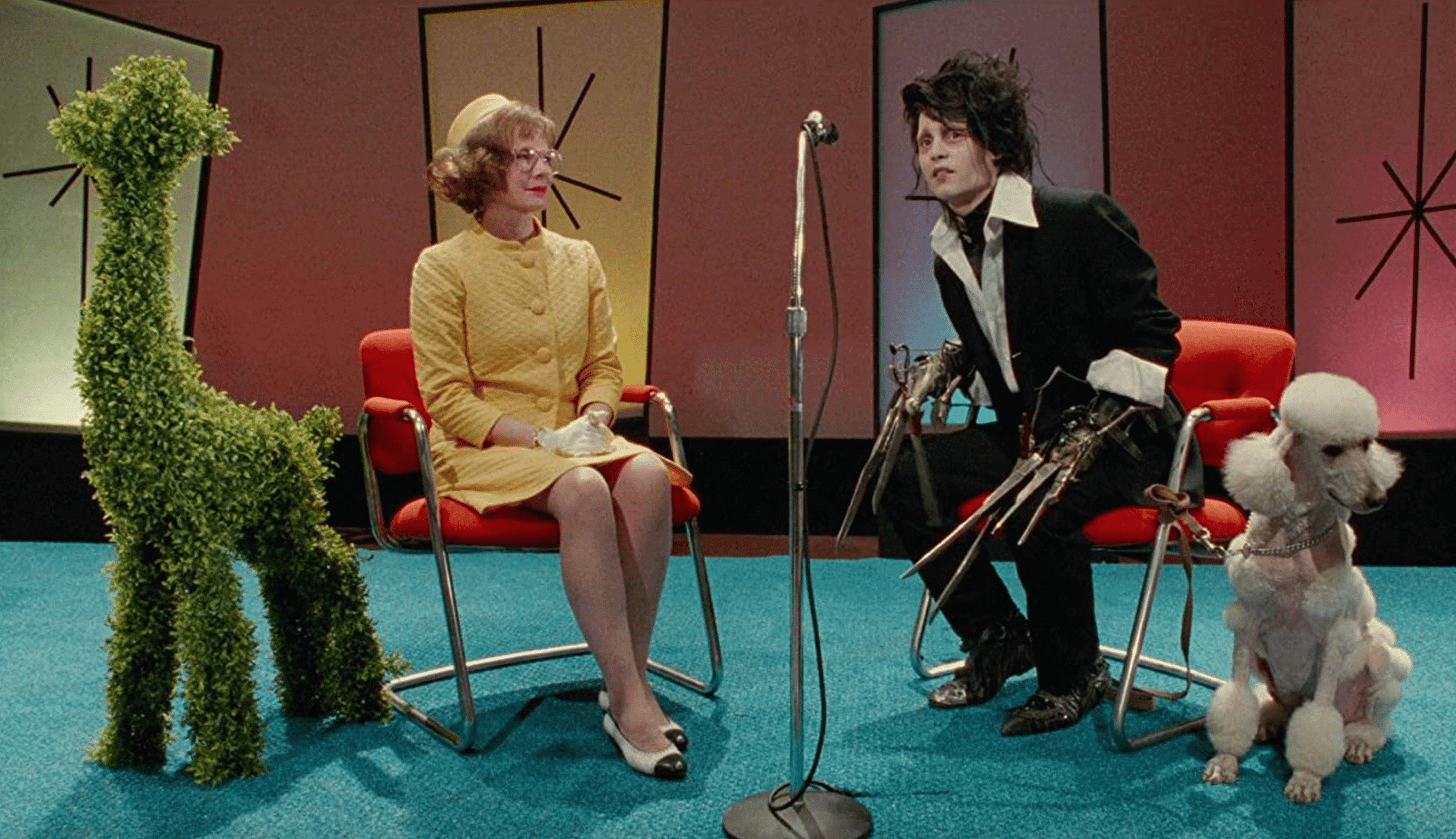They say that God created man. The man God created, in turn, sometimes dreams of playing God. Thus the possibility of creating life from nothing is one of the most important veins in horror, science fiction, and other genres. Its transgression has thrilled us for eons, from the golem of Jewish folklore to The Adventures of Pinocchio to Shelley’s Frankenstein.
Tim Burton’s luminous Edward Scissorhands (1990), is one such tale. The story of an unfinished, innocent creature made from machinery who has scissors for hands is ripe for Halloween viewing (or re-viewing). Edward (Johnny Depp, in his first of many collaborations with Burton) is the soft-spoken, sharp-fingered masterpiece made by the elderly Inventor (Vincent Price, in his final major appearance). The two live together in a castle as gothic as Edward’s appearance (The Cure’s Robert Smith was Burton’s inspiration for Edward’s hair). But before the Inventor can finish Edward by giving him human hands, he suddenly dies, leaving Edward wholly alone and isolated.
Peg Boggs (Dianne Wiest, whose performance is so warm you’ll wish she were your own mother) eventually calls on the castle in the hopes of selling some Avon products and ends up inviting the lonely Edward to live with her. After Edward descends into Burton’s parti-colored send-up of suburbia, we’re treated to a little scene in a flashback that depicts some of the Inventor’s efforts to educate Edward during his creation. Part of that education is in poetry.
There Once Was a Boy Made of Scissors
The Inventor reads to Edward from a book of etiquette on the subject of how to behave while having a cup of tea. After some particulars, the Inventor reads this sentence: “‘Etiquette tells us just what is expected of us and guards us from humiliation and discomfort.’”
He pauses, looks at Edward, then offers his pronouncement: “Boring!”
As a tonic, the Inventor opens a different book, a huge tome with the words The Book of Poetry on its cover. He then reads out a limerick:
There was an old man of the Cape Who made himself garments of crepe. When asked, "Do they tear?" He replied, "Here and there, But they're perfectly splendid for shape!"
The limerick Price reads out has been attributed to Robert Louis Stevenson, better known for his novel Treasure Island and his novella Strange Case of Dr Jekyll and Mr Hyde. This poem is a shrewd choice because it describes torn clothing, something we experience visually in this film more than once.
But while the limerick may be appropriate and humorous (kind of?) it’s not obscene, which is often a key feature of limericks. Limericks first appeared in the 18th century, and follow a strict AABBA rhyme scheme. They set up an expectation with the establishment of a rhyming couplet (the A rhymes), modify or change that expectation with a second, different rhyming couplet (the B rhymes), then return to the original A rhyme with a renewed, skewed, or perverted understanding. These poems are, in their purest form, transgressive—often concerned with the breaking of taboos.
The Inventor is offering Edward an education in humanity by reading a limerick, for such poems elicit laughter, call social norms into question, and bring joy. And Edward himself ends up with a hard-won education in the trenchant nature of social taboos.
There Once Was a Form So Endearing
In his iconic role as John Keating, Robin Williams delivers this line in Dead Poets Society:
“Medicine, law, business, engineering—these are noble pursuits and necessary to sustain life. But poetry, beauty, romance, love, these are what we stay alive for.”
Edward’s creator understood this truism well. Edward does remarkably well as a houseguest, particularly in light of his physical limitations. He has very good manners. The denizens of the suburban community Edward enters all have decent manners as well: they know the rules of their society.

We watch Edward learn these rules, too, but we see how hollow they are. His greatest success is not as a mimic of human behavior, but as a living emblem of humanity’s best traits: It is his kindness, his empathy, and his creativity that endear him to the neighborhood (at least at first). And it is poetry, not etiquette, that has the power to increase these aspects of our humanity.
In Gothic Fantasy: The Films of Tim Burton, the filmmaker cites Scissorhands as his most personal work. It may also be his most poetic. Though the literal poetry begins and ends with the limerick in Edward Scissorhands there’s visual poetry aplenty. And screenwriter Caroline Thompson has even referred to her script for Edward Scissorhands as a “love poem” that she wrote to Burton.
When we invoke the term “poetic” to describe something, we’re often responding to the artful curation of highly emotional content, to raw beauty, and to the ineffable. By that measure, Edward Scissorhands is not only spooky, it’s a poem about the beauty of the weird.






Love this post, Caitlin :)